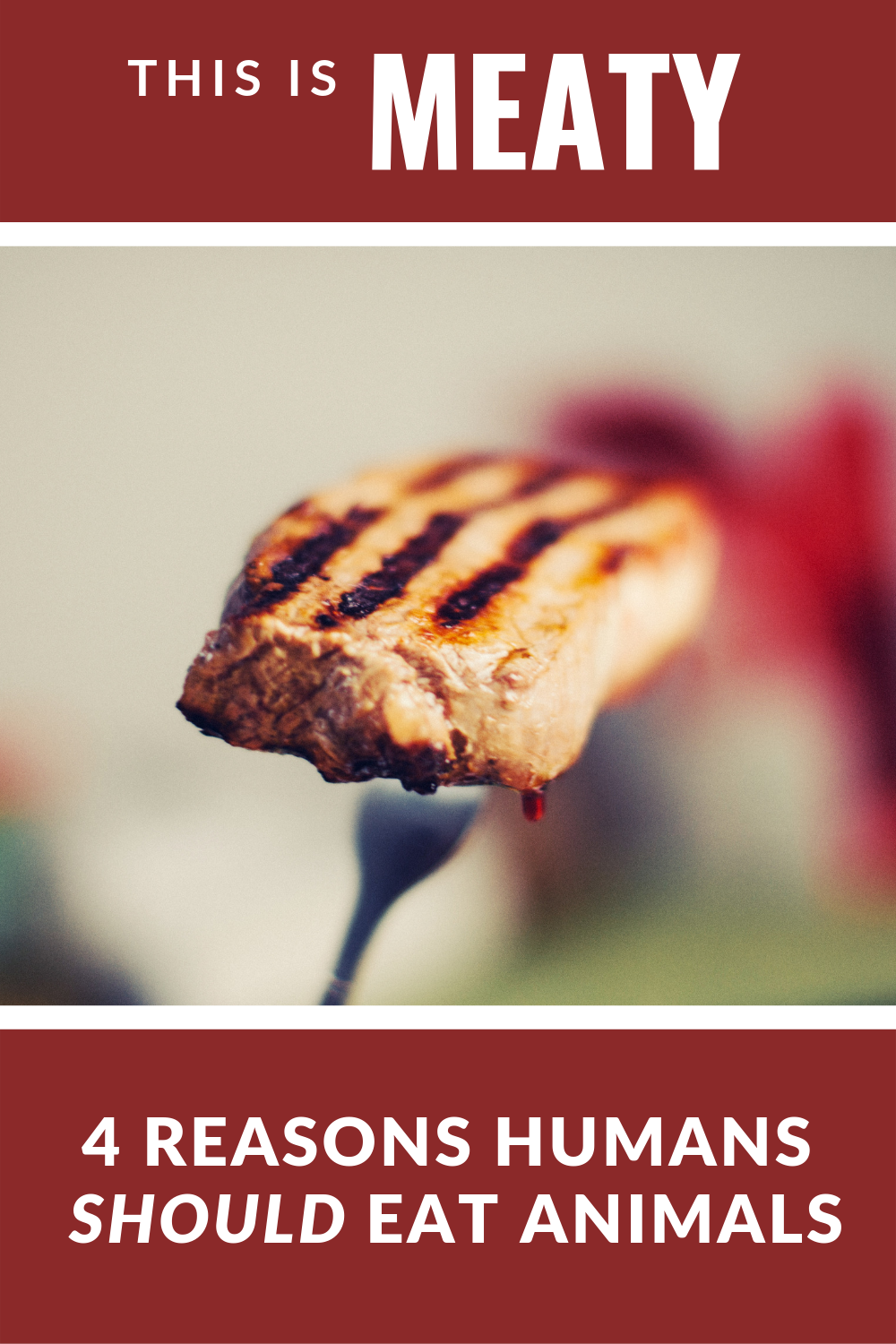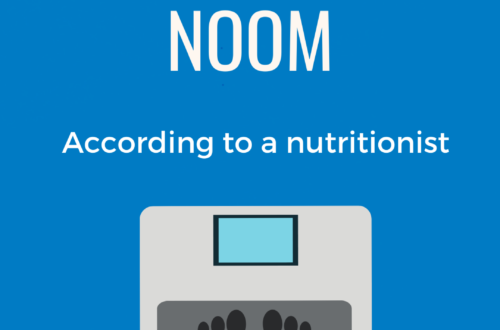
This is Meaty – 4 Reasons Humans Should Eat Animals
If you’ve read my post on the pros and cons of veganism, you know that I was a vegan for two years, meaning I did not eat any animal products (even honey!). My choice to eat plant-based was motivated by a desire to lower my risk for chronic disease (personal health) have less impact on the environment. While I know that eating vegan is more Earth-friendly than an omnivore diet, I’m not convinced that avoiding animal products is the healthiest way to eat.
Made For Meat-Eating
Sorry vegans, but humans are omnivores, and we wouldn’t have progressed this far, meaning, we wouldn’t have become homo sapiens without the nutritional density of meat. Imagine our ancestors subsisting on only fruits and vegetables. These are not particularly calorie-dense foods and require a lot of labor – early humans spent the majority of their time trying to find enough food to survive! When a skilled hunter brought home a 100-lb deer, the caloric and nutrient density of that meat far exceeded that of plant food. And, overall, hunting and processing a deer takes less time and energy than procuring plant foods. The end result was better-nourished people with more time on their hands, which meant that our brains got bigger, we got smarter, and our jawline got a little less prominent.
Being a Vegan Isn’t Always Healthy
Veganism done poorly will lead to nutritional deficiencies. I’ve known vegans who eat a lot of “plant-based” foods like potato chips and soda and very few fresh vegetables, protein-rich legumes, or whole grains. Whether you’re vegan or not, eating mostly empty calories is not good for your body; however, the absence of animal products to bolster nutrient intake means that poorly-executed vegan diets are especially unhealthy.
- Calcium and vitamin D intakes among vegans tends to fall short in comparison to non-vegans, including lactoovovegatarians (those who eat eggs and dairy but no meat or fish). Several studies have shown that vegans have a lower average bone mineral density and are at greater risk for bone fracture. Nutrition experts recommend that vegans consume calcium-fortified foods and take a vitamin D supplement.
- Vitamin B-12. Vegans have higher prevalence of vitamin B-12 deficiency compared to lactoovovegetarians and omnivore. Vitamin B-12 deficiency can produce neurologic and psychiatric symptoms that include impaired coordination, mood disturbances, and difficulty with concentration. Children with low B-12 levels may experience apathy and failure to thrive. Macrocytic anemia (also known as “vitamin deficiency anemia”) is more common in vegans at all ages.
- There are other deficiencies that are possible but less common and well-documented, in large part because it is believed that the body has compensatory measures to counteract lower intake of these nutrients to prevent a physiological deficiency.
- Iron deficiency is a concern because heme iron (ie, from animal sources) is absorbed better by the body than non-heme (ie, from plants). Still, vegans to not seem to have more prevalent iron deficiencies compared to non-vegans.
- Zinc. Vegans are often considered to be at risk for zinc deficiency because phytates, a common component of grains, seeds, and legumes, bind to zinc and decrease its bioavailability. Although vegans do tend to have lower intakes of zinc, they do not symptoms of deficiency.
- Long-chain polyunsaturated fatty acids DHA (docosahexaenoic acid) and EPA (eicosapentaenoic acid). DHA and EPA are made in the body from alpha-linolenic acid (ALA), and vegans diets tend to produce lower amounts of DHA and EPA in the body, which are important for cardiovascular, eye, and brain health. Yet, vegans have reduced risk of cardiovascular disease.
Animals Provide Ideal Protein
Complete protein only comes from animal products, not plants. There are twenty essential amino acids, and our body cannot make nine of them, so we have to get them from food. Animal protein contains all twenty; plant protein does not. Vegans can largely relax about this one, as long as they eat a variety of protein-rich plants (for example, combining beans with brown rice) because all amino acids can be found in plants, it’s just that no single plant contains all twenty.
Deliciousness
Meat, fish, dairy, and eggs are delicious. Let’s forget about the junk foods like chicken-fried steak and ice cream for a minute. Who can argue that bacon isn’t mouth-watering, savory heaven? Or dispute that a wedge of aged cheese with hamon is a sublime culinary combination. Whether you love whipping cream in your coffee or smoked salmon with creme fraiche, animal-based foods are some of the most delectable known to man. Yes, there are substitutes, and some are pretty good, but the real deal is so satisfying. It feels too right to be wrong.
Takeaways
I’m not trying to convince vegans to change their diet in any way. There are many benefits to eating more plants and fewer animal products – that cannot be disputed. What I’m saying here is that we, as humans, are physiologically adapted to eating meat and getting nutritional value from it. My argument is that meat, fish, dairy, and eggs are part of the healthiest of diets – they are naturally some of the most nutritious foods available. Just eat animals responsibly.
What do you think about the role that animal products should or shouldn’t have in the human diet? Have you converted to or from vegetarianism or veganism? If so, what was your experience? As always, I’d love to hear your stories and comments!





One Comment
Pingback: